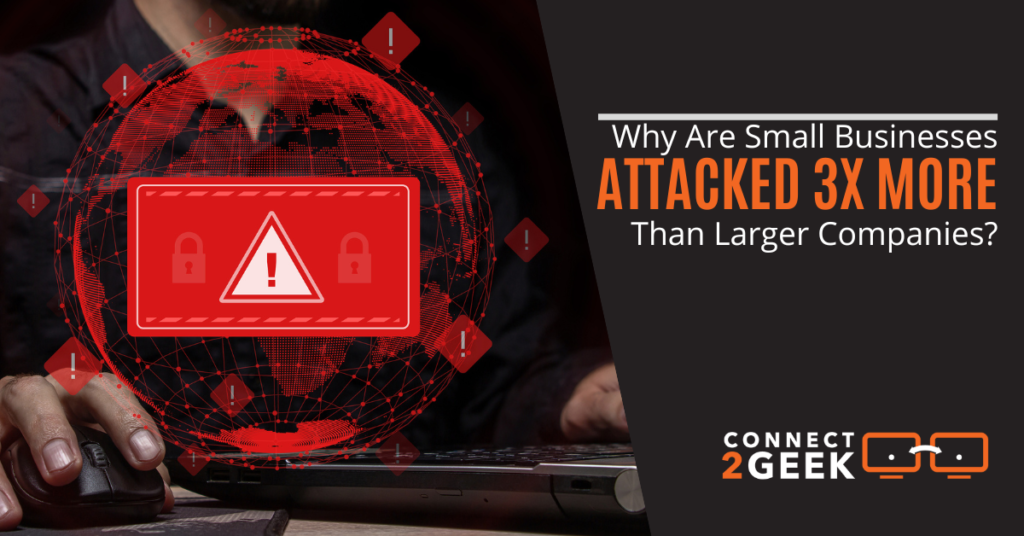
Why are small businesses at constant risk for cyberattacks? Small businesses often do not see the need to protect IT, which affects their business security. Due to the size of their business operations, they assume that hackers aren’t going to want to go after them and that it’s larger companies that they are more interested in.
However, after analyzing millions of emails from different companies, Barracuda Network reported that small businesses are actually more prone to experience cyberattacks than larger companies.
Let’s look at the reasons.
5 Reasons Small Businesses are Targeted by Cyberattacks
1. Small businesses often do not prioritize cybersecurity.
Small businesses are attacked more than larger companies because they often do not have the expertise and capability to enforce cybersecurity measures. For this reason, they cannot always protect themselves from cyberattacks using less sophisticated technologies.
In addition, the employees of small businesses may not be exposed to security awareness training to help them defend the organization from these cyber threats. This is usually because many employers of small businesses are convinced that cyber breaches are only directed at larger companies and they don’t want to take the time away from operations for this training.
2. Small businesses are gateways to larger companies.
Small businesses function as gateways to larger companies. Bigger companies are generally security conscious and put multiple cybersecurity measures in place to protect the organization. It makes it very difficult for cybercriminals to break their defenses.
However, many of these small businesses are subcontractors to larger companies. For instance, larger companies may employ them to provide their cleaning needs, human resources solutions, and other business services.
The reason is not far-fetched. When larger companies contract small businesses to take care of some of their services, they are often connected to the IT of these more prominent companies. Getting in through a small business increases the chances of gaining access to the larger companies.
3. Small businesses are easily exposed to malware.
The business world has gone digital, and small businesses are not left out of the trend. Many small businesses now favor e-commerce and apply digital tools in running their companies. However, they often don’t properly secure their cloud applications or account logins.
They may think that the SaaS provider is handling it all (which isn’t the case). Small business owners also can believe that they’re “too small” to have to worry about things like mobile device management or cloud access security broker solutions.
The lack of password security and cloud misconfiguration easily expose companies to malware carefully hidden in various applications and emails.
4. Small businesses are more willing to pay a ransom.
Hackers often play the long game. They can breach a system, and then silently spread malicious code, waiting until it reaches multiple endpoints to trigger something like ransomware. Ransomware puts operations at a standstill and smaller companies often aren’t sure what to do so they opt to pay the ransom so their business can recover.
Approximately 46% of small businesses have been targeted by ransomware attacks. And of those that fell victim to the attack, 73% paid the attacker the ransom. In most cases, this was somewhere between $10,000 and $50,000.
Small businesses may not have properly backed up all their data or have a recoverable copy that is pre-breach (especially if the hackers were quiet for a while). So, they are left with only two options- pay a ransom or risk shutting down their company for good.
Although it is not wise to negotiate with hackers, many business owners do pay the requested ransom, which just makes them larger targets the next time.
5. Small businesses have essential data.
Cybercriminals look for any type of data they can benefit from. Contrary to what many small business owners think, having a small business does not mean you do not have valuable information.
As long as you deal with people’s financial or personal information, their credit cards, social security numbers, and economic history are still beneficial to the cybercriminal. They can manipulate the data in a number of ways if they get hold of such important information.
How Can Small Businesses Stay Protected?
As a small business owner, you are already aware of the cyber threats your businesses may face. However, this does not make you helpless against cyberattacks.
You can do many things to keep your business safe and secure. Here are a few of the standard safeguards:
- Use a next-gen antivirus/ malware protection
- Implement multi-factor authentication on all accounts
- Use a business password manager so employees can securely store and retrieve passwords
- Put a mobile device management system in place
Protect Your Small Business With Connect2Geek
What steps have you taken to protect your small business from cyberattacks? You may have tried everything you know and have run out of ideas.
Not to worry, our team of cybersecurity experts has the right approach to protect your small business from cyberattacks. Feel free to contact us at 208-468-4323 or request our support online.
